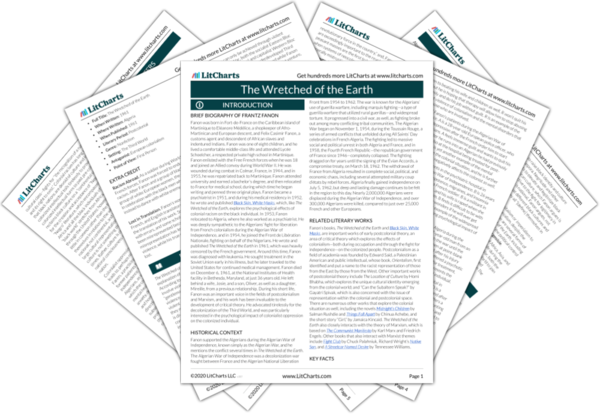The National Bourgeoisie Quotes in The Wretched of the Earth
Chapter 2: Grandeur and Weakness of Spontaneity Quotes
The great mistake, the inherent flaw of most of the political parties in the underdeveloped regions has been traditionally to address first and foremost the most politically conscious elements: the urban proletariat, the small tradesmen and the civil servants, i.e., a tiny section of the population which represents barely more than one percent.
Chapter 3: The Trials and Tribulations... Quotes
Since the bourgeoisie has neither the material means nor adequate intellectual resources such as engineers and technicians, it limits its claims to the takeover of businesses and firms previously held by the colonists. The national bourgeoisie replaces the former European settlers as doctors, lawyers, tradesmen, agents, dealers, and shipping agents. For the dignity of the country and to safeguard its own interests, it considers it its duty to occupy all these positions. Henceforth it demands that every major foreign company must operate through them, if it wants to remain in the country or establish trade.
The struggle against the bourgeoisie in the underdeveloped countries is far from being simply theoretical. It is not a question of deciphering the way history has judged and condemned it. The national bourgeoisie in the underdeveloped countries should not be combated because it threatens to curb the overall, harmonious development of the nation. It must be resolutely opposed because literally it serves no purpose. Mediocre in its winnings, in its achievements and its thinking, this bourgeoisie attempts to mask its mediocrity by ostentatious projects for individual prestige, chromium-plated American cars, vacations on the French Riviera and weekends in neon-lit nightclubs.

The National Bourgeoisie Quotes in The Wretched of the Earth
Chapter 2: Grandeur and Weakness of Spontaneity Quotes
The great mistake, the inherent flaw of most of the political parties in the underdeveloped regions has been traditionally to address first and foremost the most politically conscious elements: the urban proletariat, the small tradesmen and the civil servants, i.e., a tiny section of the population which represents barely more than one percent.
Chapter 3: The Trials and Tribulations... Quotes
Since the bourgeoisie has neither the material means nor adequate intellectual resources such as engineers and technicians, it limits its claims to the takeover of businesses and firms previously held by the colonists. The national bourgeoisie replaces the former European settlers as doctors, lawyers, tradesmen, agents, dealers, and shipping agents. For the dignity of the country and to safeguard its own interests, it considers it its duty to occupy all these positions. Henceforth it demands that every major foreign company must operate through them, if it wants to remain in the country or establish trade.
The struggle against the bourgeoisie in the underdeveloped countries is far from being simply theoretical. It is not a question of deciphering the way history has judged and condemned it. The national bourgeoisie in the underdeveloped countries should not be combated because it threatens to curb the overall, harmonious development of the nation. It must be resolutely opposed because literally it serves no purpose. Mediocre in its winnings, in its achievements and its thinking, this bourgeoisie attempts to mask its mediocrity by ostentatious projects for individual prestige, chromium-plated American cars, vacations on the French Riviera and weekends in neon-lit nightclubs.











